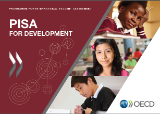|
The baseline for an education goal could potentially be set through the increased numbers of middle- and low-income countries participating in PISA, for the 2015 cycle and beyond. Significant advantages include:
- A single reference against which to rigorously gauge the degree of progress made towards targets for educational quality and equity.
- A comparable and robust measure of progress to allow all countries – regardless of their starting point – to establish themselves on an improvement trajectory to achieve targets referenced to common international goals.
- Credible and comparable results: PISA requires participating countries to follow common technical, institutional and administrative standards for the assessment.
- An opportunity to help build institutional capacity. Countries are responsible for overseeing PISA implementation; therefore, participation in PISA can also drive improvements in institutions. This capacity building could be implemented directly with development partners in a way that creates spill-over benefits to other parts of the educational sector
Countries that have signed Participation Agreements with the OECD to participate in PISA for Development include:
PISA for Development National Project Managers (NPMs) oversee the implementation of PISA for Development in each participating country/economy.
|
|
PISA for Development Brochure

Contact the team
Back to PISA for Development Home
|










